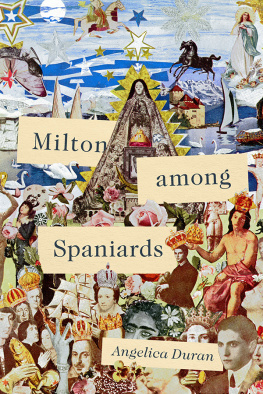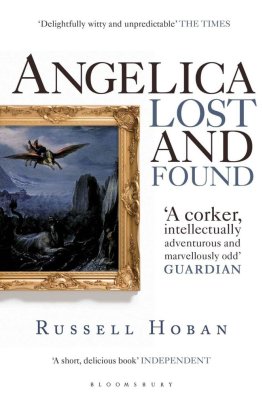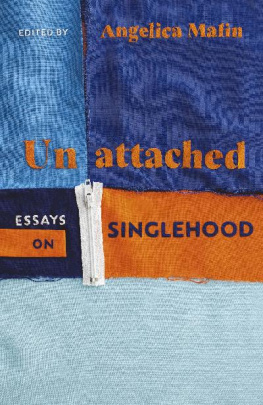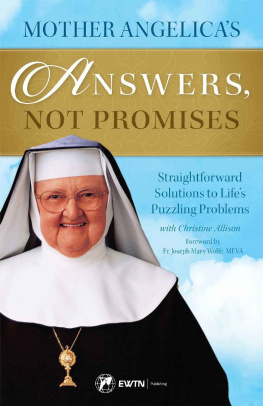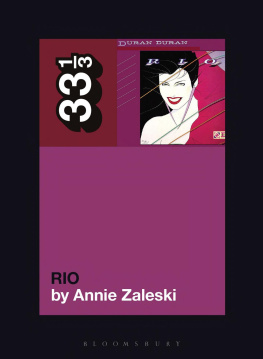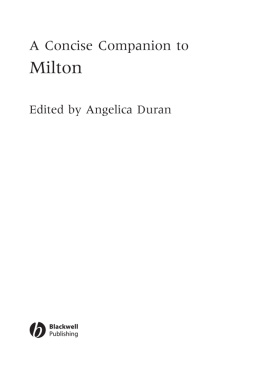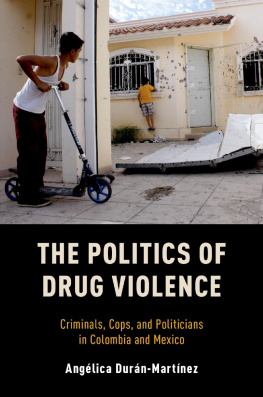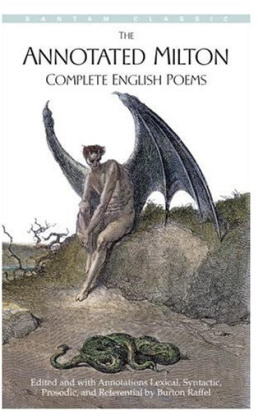Angelica Duran - Milton Among Spaniards
Here you can read online Angelica Duran - Milton Among Spaniards full text of the book (entire story) in english for free. Download pdf and epub, get meaning, cover and reviews about this ebook. year: 2020, publisher: University of Virginia Press, genre: Art. Description of the work, (preface) as well as reviews are available. Best literature library LitArk.com created for fans of good reading and offers a wide selection of genres:
Romance novel
Science fiction
Adventure
Detective
Science
History
Home and family
Prose
Art
Politics
Computer
Non-fiction
Religion
Business
Children
Humor
Choose a favorite category and find really read worthwhile books. Enjoy immersion in the world of imagination, feel the emotions of the characters or learn something new for yourself, make an fascinating discovery.
- Book:Milton Among Spaniards
- Author:
- Publisher:University of Virginia Press
- Genre:
- Year:2020
- Rating:3 / 5
- Favourites:Add to favourites
- Your mark:
- 60
- 1
- 2
- 3
- 4
- 5
Milton Among Spaniards: summary, description and annotation
We offer to read an annotation, description, summary or preface (depends on what the author of the book "Milton Among Spaniards" wrote himself). If you haven't found the necessary information about the book — write in the comments, we will try to find it.
Milton Among Spaniards — read online for free the complete book (whole text) full work
Below is the text of the book, divided by pages. System saving the place of the last page read, allows you to conveniently read the book "Milton Among Spaniards" online for free, without having to search again every time where you left off. Put a bookmark, and you can go to the page where you finished reading at any time.
Font size:
Interval:
Bookmark:
THE EARLY MODERN EXCHANGE
Series Editors
Gary Ferguson, University of Virginia;
Meredith K. Ray, University of Delaware
Series Editorial Board
Frederick A. de Armas, University of Chicago; Valeria Finucci, Duke University; Barbara Fuchs, UCLA; Nicholas Hammond, University of Cambridge; Kathleen P. Long, Cornell University; Elissa B. Weaver, Emerita, University of Chicago
Titles in the Series
Milton among Spaniards, Angelica Duran
The Dark Thread: From Tragical Histories to Gothic Tales, edited by John D. Lyons
Women Warriors in Early Modern Spain: A Tribute to Brbara Mujica, edited by Susan L. Fischer and Frederick A. de Armas
Advertising the Self in Renaissance France: Lemaire, Marot, and Rabelais, Scott Francis
Retelling the Siege of Jerusalem in Early Modern England, Vanita Neelakanta
The Enemy in Italian Renaissance Epic: Images of Hostility from Dante to Tasso, Andrea Moudarres
Involuntary Confessions of the Flesh in Early Modern France, Nora Martin Peterson

University of Delaware Press
2020 by Angelica Duran
All rights reserved
Printed in the United States of America on acid-free paper
First published 2020
978-1-64453-171-6 (cloth)
978-1-64453-172-3 (paper)
978-1-64453-173-0 (e-book)
9 8 7 6 5 4 3 2 1
Library of Congress Cataloging-in-Publication Data is available for this title.
Cover art: Opening collage of Lorca en color (1969) by Gregorio Prieto. (Fundacin Gregorio Prieto; image by Kristin Leaman, courtesy of Indiana University Libraries)
To Sean OConnor
Todas cosas bajo / Del cielo eres t para m, todos lugares t
(Paradise Lost 12.61718)
Figures
Acknowledgments
In this book I hope to share the exhilaration I have experienced in researching and writing it, the only apt response to the rich works that constitute the Miltonic strand of the complex, vital, and long-standing conversations of two of the westernmost countries of Europe, England and Spain. My home institution of Purdue University provided invaluable support for this project, including a Library Scholars Grant that funded my summer-long tour of Spanish libraries and cultural institutions (summer 2005), College of Liberal Arts Deans Research Incentive Grants (2003, 2005, 2007), research leaves (spring 2007, autumn 2013spring 2014, spring 2016, autumn 2016spring 2017), and a Center for Humanistic Studies fellowship (autumn 2007) that released me from teaching duties; the encouragement from the administrative staff and faculty of the Comparative Literature and Religious Studies Programs; the flexibility that the English Department afforded me in teaching undergraduate and graduate courses that gave me forums for developing many of the ideas herein; and the Purdue University Libraries for its extraordinary and personalized service. I thank my Purdue colleagues Howard Mancing and Elena Benedicto for welcoming me to their Spains.
I was touched throughout the creation of this book by the generosity of librarians and scholars throughout the U.S., Europe, and Mexico. The Newberry Librarys Audrey Lumsden-Kouvel Fellowship (summer 2008) was invaluable to me in the middle stages of the research for this project, as was the University of Texas at Austin Harry T. Ransom Center Fellowship (winter 2016) and Fulbright-Garca Robles Grant (fall 2016spring 2017) during the final stages. From beginning to end I received advice about and copies of noncirculating rare works from the librarians and curators at the Dal Museum in St. Petersburg, Harvard University, National Library of Spain in Madrid, Newberry Library, Northwestern University, Scottish National Portrait Gallery, Stanford University, University of California at San Diego, University of North CarolinaChapel Hill, and members of the Milton Society of America. I thank the audiences at the Modern Language Association of America conventions (2005, 2007, 2011, 2013, 2015), Conferences on John Milton (2005, 2007, 2009, 2015), International Milton Symposiums (2005, 2008, 2015), Newberry Milton Seminar (2007), Midwest MLA Conference (2007), Renaissance Society of America Conference (2008), International Milton Conference (2008), and Reception Studies Society Conference (2009) for their incisive comments on material for this book that I presented. Earlier versions and portions of this book have appeared as journal articles and book chapters, which I acknowledge in the notes. I am grateful to the Herraderos de Federico Garca Lorca for permissions to publish Lorcas Adn and Dos Normas in Spanish, as well as to the institutions that provided the illustrations, as noted in the captions.
For their support in the form of letters of recommendations for research grants and finessing of my arguments and interpretations, I thank Edward Jones, Laura Knoppers, Mario Murgia, and Elizabeth Sauer. I am especially grateful to David Gies and Jonathan Culler for their willingness to provide a (then) stranger with the aid of their expertise; Robert Fallon, John Leonard, and John Shawcross for reviewing early versions of these chapters; and Nicholas von Maltzahn for reviewing the final draft of chapter 1, Wendy Furman-Adams the final draft of chapter 4, and Elizabeth Sauer the epilogue. I thank John Rumrich and Jacqueline Borchert for practical help in the final stretch, and all encouragement before that. I am indebted to the members of the University of Delaware Press: Director Julia Oestreich for her professionalism and guiding spirit, the anonymous reviewers for their generous and smart comments, and Tim Roberts and the editorial staff for attending to the details of format and legibility.
For their interest, enthusiasm, and intelligence at dinner-table conversations about our daily labors, I thank my children, Jacqueline and Paul. I bear full (and sad) responsibility for the faults of this book. For its strengths, I credit my most beloved husband, Sean OConnor, to whom this book is dedicated. For making wondrous adventures out of otherwise wearying research trips in Spain, Latin America, and the U.S., demanding that I attend to the humane elements of my study and its audiences, and providing me with the rare experience of the ideal relations of individuals recorded in this study, I am ever grateful.
Y como siempre, se termina con Adis.
Introduction
Blessed the time, and blessed the centuries, called by the ancients the Golden Ageand not because, then, the gold which we in our age of iron so value came to mens hands without effort, but because those who walked the earth in that time knew nothing of those two words, thine and mine.
Miguel de Cervantes Saavedra, Don Quixote, translated by Burton Raffel (emphases mine)
A s John Phillips would have it, John Miltons presence among Spaniards began by 1605three years before Miltons birth in 1608. Miltons nephew and one-time student Phillips inserts an anachronistic reference to his uncles masterwork, Paradise Lost (1667), in his 1687 English translation of Miguel de Cervantes Saavedras Don Quixote (1605), where the character Don Diego de Miranda describes his disappointment in his sons preference for the study of literature over the more profitable study of law or divinity:
He spends whole days in his Criticisms, whether Homer said well or ill, in repeating Tond Apomeibomenos so often?whether such an Epigram in Martial ought not to be expungd for its Obscenitywhether Virgil had he livd, could ha betterd his EneadsHe is a great admirer of Horace
Next pageFont size:
Interval:
Bookmark:
Similar books «Milton Among Spaniards»
Look at similar books to Milton Among Spaniards. We have selected literature similar in name and meaning in the hope of providing readers with more options to find new, interesting, not yet read works.
Discussion, reviews of the book Milton Among Spaniards and just readers' own opinions. Leave your comments, write what you think about the work, its meaning or the main characters. Specify what exactly you liked and what you didn't like, and why you think so.

